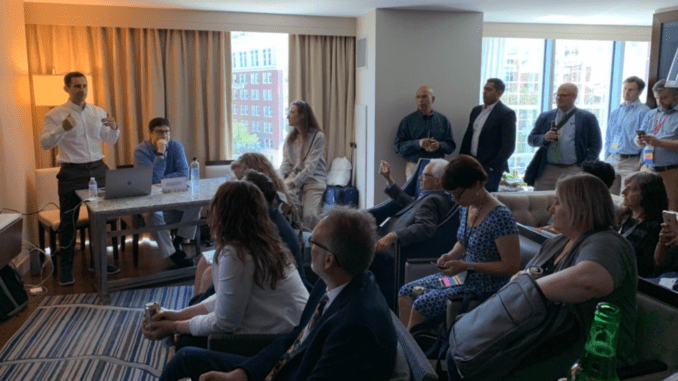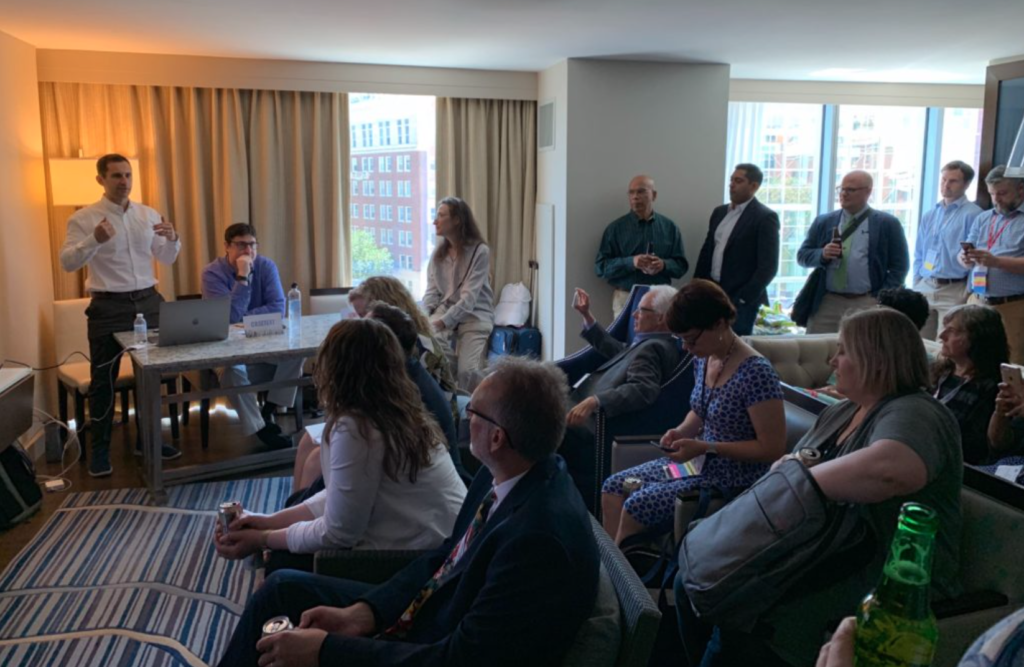
Legal Research Software Battle II: AI Goes to Washington
Guest Post by Jake Heller, CEO, Casetext, the AI-driven legal research platform
This article follows an invitation to several other legal research companies to do a live side-by-side comparison versus Casetext. Last year, Casetext invited ROSS, this time they invited Thomson Reuters’ Westlaw, BloombergLaw, and LexisNexis. As no rivals turned up, Casetext did their own reviews of the other systems (see video below) and compared them to their CARA system. This all took place at the Washington DC meeting of the American Association of Law Libraries. It follows a similar event last year that came to be known in a light-hearted way as the ‘Legal Robot Battle‘.
—
The room was packed. The anticipation was high. Standing room only. It was an unusually exciting event taking place alongside a conference for law libraries.
[Note: the video of the ‘Battle’ is below, it shows walkthroughs of several legal research products. It’s about an hour and well worth a watch.]
Last Monday at about 1 in the afternoon, over 50 law librarians from the some of the country’s top law schools, firms, and government agencies jammed into a suite on the 6th floor of a hotel in downtown Washington, DC.
They squeezed onto couches and crowded up against the walls. They were there to watch the second-ever Legal Robot Battle: a live, side-by-side comparison of the most recent advances in artificial intelligence technology for lawyers. There was only one problem: one side didn’t show up.
The week before AALL this year, Westlaw, LexisNexis, and Bloomberg Law all announced that they would finally be previewing their long-teased versions of “brief analysis” tools at the conference.
In 2016, we at Casetext pioneered artificial intelligence technology, called CARA, that analyzes briefs and complaints to help lawyers find relevant cases, statutes, briefs, articles, and other materials. These product announcements from multi-billion dollar organizations were clear attempts at ripoffs. So the team at Casetext quickly responded to them with a challenge: “Can they stand up against what is already available?”
We reached out to representatives from both companies in multiple ways: email, colleagues, Twitter, Facebook, and talking to them directly at the conference. But when the time came for them to show up for a real comparison, we were sitting alone at a table, next to empty chairs behind their name placards.
This is not the first time a would-be copycat was too afraid to demonstrate their product side-by-side with CARA. It happened in our first round of the legal robot battles, where we challenged ROSS Intelligence to a live comparison of their drag-and-drop tool EVA. ROSS didn’t show.
So, like last year’s robot battle, we did the best with what we had. Even though Westlaw, Bloomberg, and LexisNexis wilted when offered the opportunity to present for themselves, we used what information we did have about their products to do our own honest comparison.
For all the talk of ‘battles’, we did this because we believe that everyone deserves to be well-informed about their options for a task as critical as legal research. The copycat products all, on the surface, appear similar. But what they do for attorneys could not be more different.
For those who were not able to make it, legal tech blogger extraordinaire Bob Ambrogi live-streamed the entire event (see video).
Don’t have time to watch the video? The main takeaway from the event is that artificial intelligence tools that use the wisdom of what’s contained in a document are now the standard of practice.
Every major legal research provider offers it (or will, when the big companies get around to releasing their products). It’s a recognition that its something every attorney who runs a modern legal practice should do.
As the pioneers of this technology, we have the advantage of being way out ahead of our competitors in terms of functionality, usability, and quality of results. But we’re excited that competitors are entering the fray, which hopefully will push all of us to make our services even better for our customers.
Here’s our quick take on some of the key differences between the products when you compare them head-to-head;
Brief Analysis vs Context-Driven Search
When CARA was originally released in 2016, it was a feature on Casetext where you could drag in a brief to find relevant authorities you or opposed counsel left out. The 2016 version of our product is essentially what the legacy research providers are announcing now.
Since then, we have integrated CARA into our full legal research platform, which uses the context of your brief, complaint, memo, or another document to launch your search in the right direction. You can still find the cases that you or opposing counsel left out. But much more importantly, it is just a better way to do legal research, because for the first time your legal research platform takes into account the context — facts, jurisdiction, parties, legal arguments — of your case.
The offerings from Westlaw and Bloomberg are much more in line with the original version of CARA. While it is great to have a ‘check before you file’ tool, that severely limits the way this kind of technology, when done well, can serve attorneys to make them for efficient and accurate researchers. Using contextual search supercharges your ability to find relevant authorities, without limiting you to the options deemed relevant by the tool.
Security
No matter what they claim or who they are, no website is unhackable. When you’re working with a website that interacts with sometimes confidential or sensitive work-product, is essential to understand what data and work-product the site is saving and storing. When uploading a file to Casetext, the file is encrypted and is never written to disk (it stays in RAM for under a quarter of a second) and is immediately and permanently deleted from our systems.
When looking at the new tools and their offerings, law firms and organizations should pay attention to what information a tool needs to store in order to perform its search functions. The announcements from Bloomberg, Westlaw, and LexisNexis all have critical information from the brief, like its headers and key language, maintained long after the brief has been processed. If you’re evaluating this technology, make sure to ask follow-up questions about how they are storing that information.

Publishing Company vs. Tech Company
Legal research has gone through two fundamental transformations over the last few decades. The first was going online, which the legacy research providers pioneered. The second is happening now. In a world of exponentially increasing complexity and information overload, it’s no longer enough to just have information online. The best products are those that employ technology to enable people to find the best information, fast, and with ease.
This ‘Robot Battle’ was, in essence, between a cutting-edge tech company leading the vanguard in this transformation, and older publishing companies (some originally founded in the 1860s) trying to reinvent themselves for this new world.
This distinction — tech company vs. publishing company — explains so much about the products each contender brought to the table. It’s why we’ve been at this for 2016 and the others are still doing press releases and showing screenshots of products they someday hope to release.
It’s why we’ve moved from brief analysis to contextual research before they caught up to where our product was three years ago. It’s why we’re able to price our product an order of magnitude more affordably than they can. It’s why our product is blazing fast, cleanly designed, and most importantly, gets the best results. And it’s why everyone would rather forfeit the Robot Battle than choose to show up to a side-by-side comparison with our technology.
I know we poked a lot of fun at the legacy legal research companies over the past week with our Robot Battle, but ultimately, we are very excited that these companies are starting to listen to what their users have been asking for: better and more intuitive research tools. We welcome the challenge to be better at the core of what we all aim do, to equip the legal researcher with the best tools.
And as that occurs, stay tuned for more battles in the future…
About the author:
Jake Heller is the Co-Founder & Chief Executive Officer at Casetext. Before starting Casetext, Jake practiced as a litigation associate at a big law firm, clerked for a judge, and worked as a government attorney.
—
Note: Clearly this article and video contain the personal views of Jake and the Casetext team.
Artificial Lawyer is always happy to publish the views of the other legal research companies mentioned here, and those who are not, who no doubt have their own perspective.